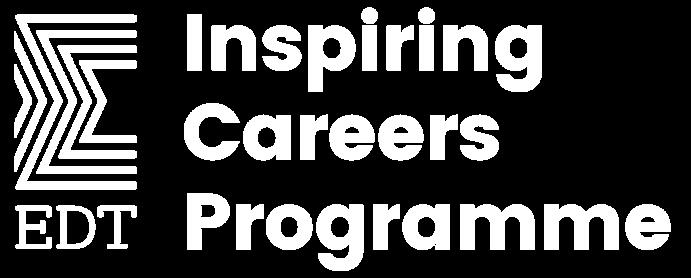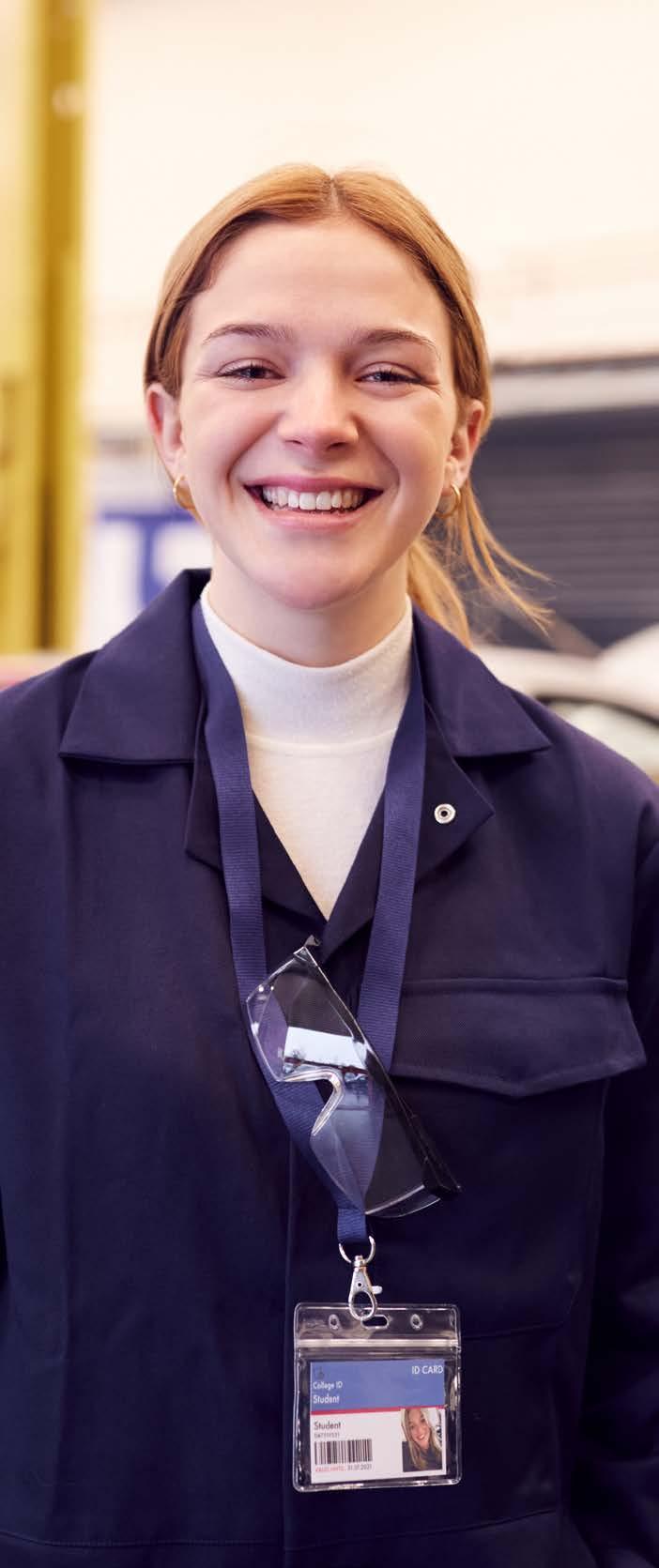

CHOICES



Whether you’re considering an academic, vocational or apprenticeship pathway, we’ve got you covered with expert advice to help you get ready to embark on your career journey.
Welcome to the latest edition of Choices Magazine!
Choices Magazine is dedicated to helping you make important decisions after turning 16. Although it has been written for Year 11s, it may also be useful for Year 12s in 6th form or college. We have also included some information for your parents or carers.
Making post-16 choices can be both daunting and exciting. To help, we have included links to many useful sites. As ever, if you have any questions, speak to a Careers Adviser, do your research and always have a backup plan.
Your Careers Adviser at school can give you information, advice and guidance on:
» Qualifications and subjects
» Choosing a sixth form, college or an apprenticeship
» Choosing a career
» CVs, job applications and interviews
» University
Your choices
In Year 11 (or Year 12, if you are doing a one-year course), you will have to make some big decisions about your future. You will likely choose one of three pathways:
Academic, Vocational or Apprenticeship.
When to choose a career path?
You must continue in education or training until at least your 18th birthday. From here, you have lots of options. You can continue at school, go to college, get an apprenticeship or traineeship, or even start your own business.
Making your choice
Before you decide what direction you want to go in, you can try answering the following questions:
» What am I good at?
» What do I enjoy?
» What are my favourite subjects at school?
» What are my current career ideas and plans?
Next, you need to find out about the opportunities available to you, the different routes you can take, and how and when to apply. You can check the websites of schools, universities or businesses, or give them a call about the best way to apply.
If you are unsure about what you want to do, you may have access to online career programmes through your school to help you decide. To find out more information, flip to the resources section at the back of this magazine.

This magazine is a guide but there are many other places to get support. Check out the resources on page 31.
TIME TO REFLECT
Consider the following questions to help you start thinking about your plans:
What are your favourite subjects?
What are your expected grades?
Do you have any career ideas yet? What might stop you from achieving your career goals?
Work and skills in a changing world
When you are thinking about what job you would like to do, consider the changes happening in the world of work right now. We use Labour Market Information to make sense of these changes and to predict future trends.
Changes in the world of work
The past few years have transformed the labour market. More people are working from home than before, and many prefer a blended approach between home and the office. But there are many jobs that need workers to be in the workplace. This is often the case in health and social care, hospitality, education, retail and transport & logistics.
We are also seeing more employers adopting a four-day working week in response to a growing demand. Employers and employees need to be flexible and able to adapt to change.

People are living longer
Medicine and healthcare are advancing all the time. We know more about the benefits of leading a healthy lifestyle, therefore, people are living longer. This means we need people working in health and social care, to look after older and frail people. Job areas that are important to this include:
» Healthcare
» Social care
» Bioscience
» Pharmacology
» Leisure
Caring for the environment
The UK government has set targets for the reduction of greenhouse gas emissions to almost zero by 2050. To achieve this target, new low-carbon technologies need to be implemented. This means new skills and new jobs are needed, for example:
» Wind turbine engineers
» Solar panel installers
» Smart meter installers
Medical apprenticeships
It is now possible under the NHS to become a medical doctor through the apprenticeship path and make a difference in people’s lives without taking the traditional route.
New technologies
Technology is constantly changing. New jobs are being created because of it, but advances in technology also make other jobs redundant.
Artificial intelligence (AI), robotics and mobile devices such as smartphones have created new lines of work. Some of the new jobs that have emerged are:
» iOS developer
» Social media and digital marketing manager
» Cybersecurity analyst
» Big data architect


What skills are needed now and in the future?
Employers want people with skills, attributes and strengths that they can apply to different settings. These are called transferable skills. Here are some that employers are looking for:
» The ability to solve problems and make decisions
» Critical thinking
» Interpersonal skills (the ability to work and communicate well with others)
» Creativity
Adaptability and resilience will also become increasingly important qualities. These skills will help people adjust to the changing work environment with its evolving technologies.
How to demonstrate your skills
You use transferable skills all the time. This could be at home, at school or by taking part in activities or hobbies.
Writing these down is useful as you can then use them on a CV, on an application form, or in an interview to demonstrate how you have used a particular skill. Look at the examples below:
Example: Timekeeping – I attend a dance school at weekends and some evenings. When I have classes or performances, I ensure that I am on time, allowing myself enough time to get where I need to be and to get changed into my costume.
Example: Written communication – I write articles for the school newsletter. When I do this, I make sure that my writing is clear and easily understood.
Academic
If you enjoy studying academic subjects in a classroom setting and perform well in exams, this route is the one for you. It is the most popular route to university and for some degree courses, A-levels are the only acceptable qualification.
On the next page are the main routes available to all Year 11s who wish to pursue the academic pathway. They include examples of basic entry requirements and the main qualifications on offer.
As well as moving up the levels, you can also move across the routes, for example from A-levels to a degree apprenticeship.
How to choose
If you are not sure what you would like to do, we advise that you go with subjects you are likely to do well at and that you enjoy!

What qualifications are needed?
Some university courses require you to have specific qualifications. Speak to your Careers Adviser to see what requirements you need to meet.
A-levels
The most common academic qualifications are A-levels. With A-levels, most students study at least three subjects. There are more than 40 A-level subjects, and the range available to you will depend on your school or college. At some schools and colleges, you can even study a mix of A-levels and BTEC Level 3 qualifications.
International Baccalaureate (IB)
This is an academically challenging programme with final examinations that prepare students for university and working life. You choose one subject from each of five groups. This includes two languages, social sciences, experimental sciences, and mathematics. You also choose either an arts subject from a sixth group or another subject from groups one to five.
The programme includes:
» an extended essay based on your own research and in-depth study, focused on one of the subjects you are studying;
» theory of knowledge focusing on critical thinking and learning across your chosen subjects;
» creativity, action and service enhance students’ personal and interpersonal development. They combine activities and academic study of the arts and creative thinking as well as physical activity and community service.
Core Maths
Core Maths is a generic title for a range of different Level 3 mathematical qualifications; it is not a qualification title in itself. Their key purpose is to widen participation in the study of mathematics from age 16. They also support the development of mathematical skills for higher education and employment.
The qualifications are an opportunity for students not studying AS- or A-level mathematics to enrol in a Level 3 mathematics course alongside their main programme of study.
They also offer a different range of progression opportunities to AS- or A-level mathematics. They will be useful for those progressing to higher education courses with a specific mathematical content. This includes psychology, geography, business, and management.

Routes through learning
Examples of the qualifications and training available from entry to Level 8.
LEVEL QUALIFICATION
Doctorate - PhD, DPhil
Entry = degree and often
Master’s or postgraduate study
Master’s degreeMA, MSc, MPhil
Entry = degree or professional experience/other qualifications
Degree and other graduate certificates/diplomas/Level 6 qualifications
Entry = Level 3 qualification
Foundation degree, HND, DipHE and other Level 5 certificates/ diplomas, etc
Entry = Level 3 qualification
Higher National certificate (HNC)/Level 4 certificates/ diplomas/NVQs
Entry = Level 3 qualification
A-levels and IB diploma
Entry = 5/6 GCSEs grades 9-4 minimum
GCSEs grades 9-4
GCSEs grades 3-1
Before applying to 6th form or college
Before making your choice of a college course or applying for 6th form, it is important to research your ideas. For detailed information about courses, visit the school or college website or read their prospectus.
Many schools and colleges have open days/ evenings or virtual events for students. These are great opportunities to ask questions and get a feel for what it will be like to study there.
If you are applying for entry in September 2026, make sure that you get your applications in as early as possible. Some courses are very popular and will fill up quickly. You may need to apply by the Easter holidays of 2026. Some popular schools/colleges even have application deadlines as early as December 2024.

Applying for university
The subjects you choose at Level 3 could be very important for your university application, so make sure to plan carefully. Some university courses need you to take specific subjects or achieve certain grades. Some also ask that you show any work experience you may have before making an application.
All university applications are made through UCAS (the Universities and Colleges Admissions Service). There is one application form and you can apply to up to five courses.
The UCAS deadline is 14th January 2026. For applications to the University of Oxford and Cambridge, and courses in medicine, veterinary medicine/science and dentistry, the deadline is 15th October 2025.
Did you know?
The number of students in higher education is growing. During 2022 - 2023, there were nearly 3 million students1 enrolled in a higher education course in the UK. There are more than 30,000 undergraduate courses2 offered by UK universities in various subject areas. This shows plenty of different career paths to choose from! The most popular course in 2021/22 was business and management with over 587,000 students enrolled in this subject.3
Other popular subjects were:
» Medicine-related subjects
» Social sciences
» Design, creative and performing arts
» Engineering and technology
You can also study a higher education course at a college. Over 240 UK colleges4 are offering a range of higher education courses and qualifications.

TIME TO REFLECT
Consider the following questions to help you plan your application for 6th form or college:
What university or courses am I interested in?
What are the entry requirements for these courses? When is the application deadline?
1 Source: Higher Education Statistics Agency, HE student enrolments by level of study, Academic years 2022/23 (site accessed 27/08/2025)
2 Source: The Complete University Guide, https://www.thecompleteuniversityguide.co.uk/subject-guide, (site accessed 27/08/2025)
3 Source: Higher Education Statistics Agency, HE student enrolments by level of study, Academic years 2022/23 (site accessed 27/08/2025)
4 Source: UCAS, https://www.ucas.com/applying/you-apply/what-and-where-study/study-options/ studying-higher-education-college (site accessed 27/08/2025)
Apprenticeships
If you know what you want to do as a job or career and are ready for fulltime work, an apprenticeship is an excellent option. It combines on-thejob training with practical studies and demands real commitment.

As an apprentice, you attend a college, university or training provider to gain a qualification for 20%, usually one day of your week. The qualification can sometimes be completed in the workplace.
You won’t have to pay for your learning. Your employer and the government cover the cost and it can take between one and five years to complete an apprenticeship. This depends on its level and whether it is full-time or part-time.
You can start an apprenticeship directly after GCSEs, A-levels, BTECs or T Levels. You can also move up the levels, from Intermediate to Advanced or Higher to Degree.
To find useful information involving apprenticeships, flip to the resources section.
Levels of apprenticeship
There are different levels of apprenticeship. The level that you start at will be determined by your experience, qualifications and what is available locally. You can search for apprenticeships on gov.uk/applyapprenticeship and you can register and apply online.
Intermediate apprenticeships
There are no set requirements here, but some GCSEs at grade 3 or above may be expected. You will be employed, earn a wage and gain a qualification.
Advanced apprenticeships
Usually require four GCSEs grades 9-4. You will be employed, will earn a wage and may gain a qualification.
Higher apprenticeships
Require a Level 3 qualification, e.g. A-levels or BTEC. You will be employed, will earn a wage and may gain a qualification.
Higher technical qualifications
HTQs are technical qualifications that have been developed by employers and awarding bodies so that students can develop the skills to do well in the workplace. They last between 1 and 2 years full-time, with part-time and distance learning options available. HTQs are available across sectors such as digital, health and science, construction, business and admin, and education and early years. By 2026, there will be even more sectors available.
Degree apprenticeships
Require a Level 3 qualification, for example A-levels or BTEC, and allow you to combine practical, workplace training with a university degree. They can lead to a Level 7 qualification, depending on the apprenticeship you are doing.
Routes through learning
Examples of the qualifications and training available from entry to Level 7.
LEVEL QUALIFICATION
Master’s Level
Entry = degree or professional experience/other qualifications
Degree apprenticeship
Entry = Level 3 qualification
Higher Technical Qualifications (HTQs)
Entry = usually a Level 3 qualification
Higher apprenticeship
Entry = usually a Level 3 qualification
Advanced apprenticeship
Entry = 4 GCSEs grades 9-4 or Level 2 qualification

Intermediate apprenticeship
Entry = some GCSEs grade 3 or above or Level 1 qualification
Traineeship
Entry = interview and/or assessment
Medical apprenticeships
The NHS offers apprenticeships that lead into more than 350 career pathways through a mix of on-the-job training and classroom learning.
Many NHS employers will pay more than the minimum wage and if you are aged 16+ to 18 in your first year of an apprenticeship, the minimum you should receive is £7.55 an hour. Most medical apprenticeships should take between one and five years to complete.
For more information regarding medical apprenticeships offered by the NHS, visit healthcareers.nhs.uk/career-planning/studyand-training/nhs-apprenticeships
What you will learn
Over a week, you’re likely to spend the equivalent of four days on work placement and one day at a training centre or college. During this time, you will develop your skills, including English and maths. At the end of your apprenticeship, you will gain a competence qualification (based on what you can do in the workplace) and a knowledge qualification, or a qualification combining both.
There is a National Minimum Wage (NMW) for apprentices. All apprentices are paid a minimum of £7.55 per hour. This applies to all 16 to 18-year-olds and to those aged 19 and over in the first year of their apprenticeship.
For further information see gov.uk/nationalminimum-wage-rates
Employers offering apprenticeships
Here is a list of some employers who offer apprenticeships. This information is taken from amazingapprenticeships.com/vacancies
» British Airways
» Royal Air Force
» Accenture
» Morrisons
» Vets4Pets
» Tui
» Openreach
» McDonalds
» BBC
» House of Commons
Did you know?
In the 2023/24 academic year, over half of those who started an apprenticeship in England were under 25 years old5 Apprenticeships are becoming more popular, and more businesses are recognising them too.
The top five most popular apprenticeship starts by sector subject area during 2022/236 in England were:
» Business, Administration and Law
» Health, Public Services and Care
» Engineering and Manufacturing Technologies
» Retail and Commercial Enterprise
» Information and Communication Technology

TIME TO REFLECT
Consider the following questions to help you plan your application for an apprenticeship:
What job or career am I interested in?
Which organisations offer this as an apprenticeship programme? When is the application deadline?
5 Source: House of Commons Library, Apprenticeship statistics for England, https://commonslibrary. parliament.uk/research-briefings/sn06113, (site accessed 27/8/2025)
6 Source: House of Commons Library, Apprenticeship statistics for England, https://commonslibrary.parliament. uk/research-briefings/sn06113, (site accessed 27/8/2025)
Vocational
Vocational qualifications like BTECs can be studied at further education colleges or schools and sixth forms. You now have the option to study for one of the new T Levels. These are equivalent to three A-levels.
Find out more about T Levels at tlevels.gov.uk/students.
Vocational qualifications are always tied to a particular area of work. They are especially suited to those who enjoy hands-on, practical experience.

How to choose
As with the academic pathway, we recommend you choose a course or subject you are interested in and feel like you can do well in.
Vocational courses also tend to be preferred by students who prefer practical learning. If this is true for you and you already have a specific career in mind, the vocational pathway could be for you!
What courses and qualifications are available?
Levels 1, 2 and 3
Vocational or work-related courses train you for a specific job, like catering, hairdressing, carpentry, bricklaying, motor mechanics or childcare.
Vocational qualifications include those at Levels 1, 2 and 3 and others such as City & Guilds qualifications. They are provided by colleges, training providers, employers and some schools and 6th forms.
During your vocational course, you will be assessed on your practical skills and on how well you do the job. A lot of the time, students will enrol part-time as part of an apprenticeship.

BTEC courses
BTEC courses are work-related qualifications which are a great way to combine theory with practice. They are ideal for students who are interested in a vocational role such as health and social care, travel and tourism, engineering, sport, business, art and design, performing arts, and public services. There are over 2,000 BTEC qualifications available across 16 sectors.
BTEC courses have compulsory and optional units and may include additional work experience. They are available at Levels 1, 2 and 3, and entry will depend on the GCSE or BTEC grades you gain at the end of Year 11.
Once you have finished your BTEC course, you may wish to continue studying at university (after Level 3), start an apprenticeship or go straight into employment.
Routes through learning
Examples of the qualifications and training available from entry to Level 8.
LEVEL QUALIFICATION
Postgraduate diplomas and other professional qualifications
Entry = degree and often Master’s or postgraduate study
Postgraduate diplomas and other professional qualifications
Entry = degree or professional experience/ other qualifications
Degree and other graduate certificates/ diplomas/Level 6 qualifications
Entry = Level 3 qualification
Foundation degree, HND, DipHE and other Level 5 certificates/diplomas/NVQs etc
Entry = Level 3 qualification
Higher National certificate (HNC)/Level 4 certificates/diplomas/NVQs
Entry = Level 3 qualification
Level 3 entry (diploma; extended diploma; BTEC; CACHE; C&G; NVQ; OCR; UAL quals)
Entry = 4 GCSEs grades 9-4, Level 2 qualification or T Levels
Level 2 certificates and diplomas (BTEC; CACHE; C&G; NVQ; OCR; UAL quals)
Entry = generally 3/4 GCSEs grade 3 or above, or Level 1 qualification
BTEC Level 1
GCSE grades 2-1 including English & Maths or entry Level 3 qualification.
Entry = interview or assessment
Did you know?
There are over 2,000 different subjects available across the different Vocational Technical Qualifications (VTQs).
NVQs are available in a range of subjects in almost every sector from healthcare to hairdressing.
Some other subjects include:
» Social care
» Teaching and childcare
» Health and beauty
» Business and management
» Construction and property
» Marketing
More information can be found here skillsforcareers. education.gov.uk/pages/ training-choice/vtqvocational-technicalqualification
TIME TO REFLECT
Institutes of Technology
Institutes of Technology (IoT) deliver higher technical training and education. They are a national network of experienced education providers and leading industry employers. There are currently 21 IoTs in England.
IoTs offer a range of training from level 3 (T-levels) to level 7 (Master’s degrees). They specialise in level 4 and 5 technical skills delivering Higher Technical Qualifications (HTQs), professional training and higher and degree apprenticeships.
Level 4 and 5 qualifications give students technical skills and occupational abilities that show employers they are ready for work. Qualified learners should be familiar with the workplace environment, equipment and procedures required for a role in their chosen sector.
Subject areas include:
» Aerospace
» Creative
» Digital
» Energy
» Food and drink
» Healthcare
» Manufacturing
» Maritime
» Science
» Transport Find out more information here institutesoftechnology. org.uk/

Consider the following questions to help you plan your application for a vocational course: What job or career am I interested in? Which schools, colleges or employers offer this vocational course? When is the application deadline?
Entering the world of work
Work experience
Why is work experience important?
Participating in any kind of work experience will give you an insight into the industry you are interested in. This way you will discover more about your own skills, talents, and knowledge.
Through work experience, you will learn about the skills required in working life and about the realities of starting a career. At the same time, you will identify the skills and talents you already have as well as those you will need to develop for the future.
By the end of your work experience, you will feel more confident, have interacted with different people and taken on responsibility yourself.
These new skills are great to list on your CV!
How to find placements
There are many ways of finding your ideal work placement, but here are a few suggestions:
» Speak to your family, friends and school.
» Contact employers directly and send them your CV and a cover letter. You need to clearly outline why you wish to complete your work experience with them. Many others may apply for work experience at the same time as you, so don’t become disheartened. Sometimes it can take a while to secure the placement that you want.
How to choose a work experience placement
When choosing a work placement, reflect on your interests, skills and the type of person you are. Ask yourself:
» What are my career hopes for the future?
» How will a placement help me achieve my goals?
» How does the placement link to my studies and interests?
There are different ways of undertaking work experience, but you might consider one or more of the following – volunteering, part-time employment, or internships and traineeships.
When working in an Architect office we were given a project to complete. We had to finish all of the tasks to the deadlines written on the information sheet. We had to follow instructions, make phone calls and create a report to hand in about all of the tasks – My team won!
One of our work experience students - London
Part-time employment
Many students take on a part-time job while at school or college, to gain experience and to earn some money.
Part-time opportunities are often found in shops, supermarkets, cafés or catering companies. However, they are not always advertised, so always keep an eye and an ear out in your personal network.
Depending on the type of work, you might need to be at least 16 years old and have a National Insurance number.
Your National Insurance number should arrive automatically in the post just before your 16th birthday. If it doesn’t arrive, telephone 0300 200 3500 or visit gov.uk/apply-nationalinsurance-number for help.
Any part-time work must not interfere with your school studies. There are guidelines about the hours you can work and restrictions on the type of work you can do. See gov.uk/childemployment
Here are a few tips for finding a part-time job:
» Ask your family, friends and neighbours if they know of any vacancies.
» Write or update your CV, and draft a cover letter.
» Contact employers directly –visit or phone them to find out about current vacancies.

I have developed my understanding of what takes place when you work in retail, improving my communication and teamwork skills. I had to speak to and listen to a lot of different people which helped me learn about the work place I was in. I showed them to the different aisles to get what they needed. One of our work experience students - North East
Volunteering
Anyone can volunteer. It can be very rewarding and it is a great way to:
» meet new people
» gain new skills or develop existing ones
» get work experience
» make a big difference in your community, and
» develop skills which employers look for.
There are many ways to volunteer and help others. From working in your local area or making a regular commitment to volunteer with a charity or community group.
There are several organisations that can help you find a way to volunteer that suits you. Doit.life is a database of UK volunteering opportunities. You can search more than a million opportunities by interest, activity or location and then apply online.
Young people can also volunteer either at school or in their own time. There are many organisations that offer volunteering, so take a look at our resources to find out more.

Internships
An internship allows you to gain work experience with an employer. You can immerse yourself in a particular sector and job through hands-on experience and it can last from anywhere between a week to a year. Not all internships are paid, so you will have to check with your employer, but many will offer the National Minimum wage.
You can complete an internship as a student or graduate to build your professional skills. An internship can also lead to full-time employment with the same employer.
Supported internships
A supported internship is an unpaid workbased study programme that lasts for at least six months. It should include an extended work placement.
Supported internships are for young people aged 16-24 with learning difficulties or disabilities with an Education Health and Care
TIME TO REFLECT
Plan. As an intern, you will spend most of your time on work placements with an employer, while getting support from a trained job coach. You will also complete a personalised study programme at a school or college. This might include the chance to study for relevant qualifications.
You can apply for supported internships through your school or college. For more information visit nationalcareers.service.gov. uk/explore-your-education-and-trainingchoices/supported-internship
How to find an internship
» Speak to your teacher or Careers Adviser about existing employer partnerships.
» Reach out to employers directly to ask if they offer any intern programmes (more advice on applying online on page 24).
» Search for opportunities on specialist internship websites (see resources section on page 31 for more information).
Consider the following questions to help you plan for an internship:
What kind of experience or skills do I want to gain?
What internship would best suit my career path?
Are there any companies or organisations I admire/would like to work with?
Celebrating neurodiversity
What is neurodiversity?
Neurodiversity simply means the different ways peoples’ brains work - we are all neurodiverse. Neurodivergent is when someone’s brain processes, senses and learns differently from what is considered ‘typical’. Some of the most common neurotypes are ADHD, autism, dyslexia, dyspraxia, and Tourette’s Syndrome. However, acquired neurodivergence through health conditions including mental health are also increasingly falling under this umbrella term.
Neurodivergent people have many significant strengths. However, they may face specific struggles in workplaces that are not inclusive. They might need longer to process information, struggle with time management or with navigating team dynamics.
Employers are becoming more aware that embracing neurodiversity is important. Having a diverse group of people improves employee morale, increases customer loyalty, brings different viewpoints to the table, and positively impacts corporate culture.
Benefits of neurodiversity in the workplace:
» Problem-solving
» Loyalty to people, a cause or an organisation
» Providing a unique perspective
Accessing support at university
Many universities have learning support plans in place to help you get the most out of your studies and adapt the course to your needs. If you are unsure of what support is available, reach out to your university to find out more.
How to spot a neurodiverse employer
When looking for work, check if the organisation is Disability Confident. Do not hesitate to ask about the support they offer to employees who are neurodivergent.

Dyscalculia
Verbal skills
Innovative thinking
Creativity
DCD/Dyspraxia
Verbal skills
Empathy
Intuition
Honesty
ASC (Autism
Spectrum Condition)
Concentration
Fine detail processing
Memory
Dyslexia
Visual thinking
Creativity
3D mechanical skills
Neurodivergent strengths
Resilience Sensoryawareness
Mental health
Depth of thinking
Expression
Acquired Neurodiversity
ADHD (Attention
Deficit Hyperactivity Disorder)
Creativity
Hyper-focus
Energy and passion
Hyper-focus
Tourette Syndrome
Observational skills
Innovativethinking
Adaptability
Empathy
Cognitive control
Creativity

Advertising yourself
To apply for placements, apprenticeships and jobs, you may need to complete an online application form, record an application video or submit a CV and covering email.
In the age of social media and smartphones, we are always connected and use these tools to present ourselves to the outside world. People increasingly use social media to search for jobs or to start their own brand, especially in the creative industries.
It’s important to know how to navigate these online spaces and what to look out for once you are ready to enter the professional world.
Your online profile
Have you ever Googled yourself? The results that come back say a lot about you. Making sure the online ‘you’ is positive and professional is important when looking for work. Enable the correct privacy settings for your social media accounts. Also, think carefully before posting anything that you would not like future employers to see.
Building your network
Platforms like LinkedIn or X (formerly Twitter) are great places to build your network and connect with other people. At the same time, you can join online groups and networks relating to careers that you are interested in. They are a good way to make connections with employers and hear about vacancies. Remember to always keep your profile up to date with work experience, training and qualifications undertaken.
Search for opportunities
Many companies post vacancies on their website and social media feeds first, so it can be helpful to follow those you would like to work for. Registering with specialist websites aimed at school-leavers like ‘Get My First Job’, ‘Not Going to Uni’ and ‘Rate My Apprenticeship’ can also be beneficial.
Your online presence
When browsing on social media, you will likely come across people who have built their own brands and made this their career. There are many ways to build your own brand and create a following on social media. It requires a lot of knowledge and consistency. However, if you are passionate about sharing a hobby or an aspect of your life with others, digital media marketing could be a great way to challenge yourself. There even are free courses available online to get you started, such as Google’s Digital Garage or HubSpot Academy.

TIME TO REFLECT
Consider the following questions to help you build your professional network:
What skill would I like to learn?
Which profession would I like to know more about?
Who is an expert in this field that I could approach?
What apps or tools can I use to reach out to new contacts?
TOP TIPS
for applications
Online application forms
Most applications are now online, where you need to write answers or record video responses to set questions. Here are our top tips for completing your next application:
» Visit the company’s website and social media to learn as much as possible.
» Which of your qualifications ‘fit’ the skills, duties and specifications wanted?
» Check your spelling, punctuation, capitalisation and grammar, as well as any dates in your application.
» In video applications, practice your answers to minimise the ‘umms’ and ‘aahs’.
» Save your application on your computer to remind yourself of your answers before an interview.
» Double-check every answer before pressing the ‘submit’ button.
Writing a CV
Cover emails
You will always need a cover email when sending a CV. It should tell the employer why you are contacting them and very briefly highlight the qualification, experience or skills that are most relevant to the employer and/or its vacancy.
» Keep everything short and simple - no essays are needed here!
» Focus on the vacancy and include a sentence or two about the company to show you’ve done your research.
» If you don’t have the name of a person, start the email with ‘Dear Team’.
» Finish the email with: ‘I look forward to hearing from you’.
» Highlight your skills/qualities and how they will help you in the job you are applying for.
» Get someone else to check your cover email for errors and to suggest improvements.
Not all employers use online applications, so you will still need a CV. A CV can also be used to promote yourself to a business in the hope that they might have a vacancy. When preparing your CV:
» refer to online guides but make sure to use one that is designed for UK school leavers;
» check, and re-check, your spelling, punctuation, capitalisation, grammar and dates;
» get someone else to check your CV for errors and to make further suggestions; and
» use positive language throughout.
for interviews TOP TIPS
Congratulations on your interview invite! Attending a professional interview is often quite different from the environment we are used to at school or college. It is important to take extra care and time to prepare thoroughly and go in with confidence.

Interview preparation
Find out where the interview is held and plan how to get there – a practice run is very useful. If you are doing an online interview, have a trial run with the software in advance.
Gain an understanding of the organisation you’re applying to. A Google search or browse of their website can help. Also, take some time to re-read the role description and person specification.
Check your application to ensure that you can answer questions on the information you provided. A friend, parent/carer or your Careers Adviser can also help you practice your answers to common interview questions.
Choose clothes that are smart and neat – it is better to be too smart than too casual. This goes for online interviews too.
On the day of your interview
Face-to-face interview
» Get ready in plenty of time.
» Check you have everything you need –the letter inviting you for the interview, directions to the company, and any paperwork they may have requested.
» Give yourself enough time to get there; if you get held up, make sure you phone to say you are going to be late.
» When you arrive, introduce yourself and ask for the person you are going to see.
Virtual interview
» Ensure you are in a quiet space where you will not be disturbed.
» Place your device so you have a neutral background behind you or put on a blur filter.
» Whether you are logging in from your phone or PC, ensure that the device is fully charged.
» Make sure you have a stable internet connection to avoid disconnecting mid-interview.
During your interview
» Remember it is an interview, so switch off your phone and don’t chew gum.
» Greet your interviewer in a friendly but professional manner – smile, say good morning/good afternoon.
» Always be polite.
» Body language is important – make eye contact and sit up straight to show you are engaged and listening.
» Give full answers to the questions – don’t just say ‘yes’ or ‘no’.
» Don’t be tempted to make things up to make your answers sound better - tell the truth.
» Ask relevant questions about the job and the training (avoid asking about pay, as it could look as if that is all you are interested in).
» Thank the interviewer at the end of the interview.
Assessment centre
Some employers or courses use assessment centres as part of the application process. You will probably be given the details of what an assessment centre involves if you are invited to attend one. This could include you working on presentations, group activities and discussions. Activities will be designed to see how well you would work in a team and how you fit the role, so make sure that you participate.


Financial support
The 16-19 bursary
If you are aged 16-19 years old and need help with the costs of continuing with full-time education or training, you may be entitled to receive a bursary.
Students who are most in need will be eligible to receive a bursary of up to £1,200 a year. This group includes:
» people in care
» care leavers
» people claiming income support or receiving Universal Credit
» those who get Disability Living Allowance (DLA) in their name and either Employment and Support Allowance (ESA) or Universal Credit, and
» those who receive Personal Independence Payment (PIP) in their name and either ESA or Universal Credit.
Other students facing financial difficulties may be awarded a bursary at the discretion of their school, college or training provider.
Schools, colleges and training providers are responsible for awarding bursaries to students. Except for the £1,200 bursaries for students most in need, they decide on the amount. They will also decide when bursaries are paid and will set conditions that students should meet to receive a bursary, for example, regular attendance. For more information, see gov. uk/1619-bursary-fund
Care to Learn
You can claim Care to Learn if you are under 20, caring for your child, and doing a school and college course or training programme that receives public funding (fathers are eligible if they are the main carers). An application can be made as soon as you have a confirmed place on a learning programme.
Funding is available for childcare costs, any registration fee where charged, any childcare fees you must pay in holidays and any additional travel costs you must pay to take your child to the carer. Your childcare provider must be registered with Ofsted. Find out more at gov.uk/care-to-learn.
Further education residential support
You may be interested in studying a course that is not available within a reasonable travelling distance from your home. This is sometimes the case for young people wanting to study specialist courses, for example in dance, agriculture/horticulture, music, or art and design. This may mean living away from home at a residential college. Payments are for a maximum of three years. Contact the college you are interested in directly or find more information on financial support at gov. uk/residential-support-scheme.
Child benefits and child tax credits
If you are continuing your studies or on an approved traineeship, your parents or carers will still be able to receive child benefit (if they are eligible). There is more information at gov.uk/child-benefit or call the helpline on 0300 200 3100.
They will also still get child tax credits and any other dependants’ benefits they may receive for you. Check out the HMRC site on gov.uk/government/organisations/hm-revenue-customs to find out more information on both child benefit and tax credits. For tax credits help, call 0345 300 3900.
If you have no parent or carer to support you, you may be entitled to claim benefits yourself. See your Careers Adviser or speak to Jobcentre Plus for advice.
Other support may be available for students with learning difficulties or disabilities. See your Adviser for more details.

Other financial support
Learning providers, such as colleges and training providers, have access to additional funding to support those facing difficulties in paying for books, equipment or field trips. If you face difficulties, speak to your tutor, or student support/welfare department.
Travel support
In London
Apply online at tfl.gov.uk/fares/ free-and-discounted-travel or at post offices in London.
Outside London
If you are not in London, you will need to check with your school, college or local authority for any available help with travel costs. Your local council will have information on the services, discounts and concessions available in your area for travel to school sixth form or college.

For more information on funding for higher education, see gov.uk/studentfinance
Advice for parents and carers
For more information on careers and advice aimed at parents, visit the National Careers Service website
How you can support your young person
There is such a wide choice of post-16 options, so here is a summary of key areas for you to consider when encouraging your young person to investigate further.
» Read the information that they will have received from the school.
» Talk to people who can help them, like teachers, Careers Advisers and people who run the courses (such as college lecturers and subject teachers in schools).
» Attend college and school open days/events and check application deadlines. Be aware that popular courses fill up quite quickly.
» Research apprenticeships, as these can provide an alternative career route. Look at amazingapprenticeships.com/parents. Apprenticeships can lead to degree-level study through higher apprenticeships and degree apprenticeships.
» Remind them that better qualifications can improve job prospects and that there are fewer jobs available that don’t require any qualifications.
» Help them to see that their choices now will influence their immediate and long-term future. The ‘best’ choices are those that keep their options open for longer.
» If they have a career in mind, they may need to take specific subjects and get specific grades and qualifications, in addition to doing relevant work experience.
» They can find out about specific career requirements, by talking to their adviser or by looking online at nationalcareers.service.gov.uk/explore-careers
» Encourage them to have a backup plan, just in case. It will help them – and you – feel that there are other options and will give them a sense of having more control over their lives.
» Access additional resources created specifically for parents and carers from The Careers & Enterprise Company: resources.careersandenterprise.co.uk/resources/ engaging-parents-careers-guidance-innovations-practice and from Youth Employment UK: youthemployment.org.uk/careers-advice-for-parents.
Useful resources
Welcome to the resources section. Here you will find additional information on anything we have covered in this magazine.
Making your choice
16 Personalities
Find out who you are and why you do things the way you do. This can help you understand what career paths may suit you 16personalities.com
Kudos by CASCAID ask your Careers Adviser for access
National Careers Service
Discover your skills and career options nationalcareers.service.gov.uk/discoveryour-skills-and-careers
Academic pathway
The Universities and Colleges Admissions Service (UCAS)
Information on how to apply for higher education courses, what courses are available and links to colleges and universities digital.ucas.com/search
TikTok: ucas_online
YouTube: @Ucasonlineofficial Instagram: ucas_online
The Russell Group
Access advice on the A-levels universities want for different degrees informedchoices.ac.uk/ GCSE grading scale
Information about the GCSE grades for parents, employers and further and higher education providers gov.uk/government/publications/gcse-newgrading-scale-factsheets
Vocational pathway
T Levels
A workplace skills programme equivalent to three A-levels tlevels.gov.uk/students
Institutes of Technology (IoT)
Offer high-level courses and qualifications in STEM sectors gov.uk/government/publications/institutesof-technology--2/institutes-of-technology
Apprenticeship pathway
National Minimum Wage (NMW) for apprentices gov.uk/national-minimum-wage-rates
Institute for Apprenticeships
Find general information on apprenticeships including Medical Doctor Degree Apprenticeships instituteforapprenticeships.org/ apprenticeship-standards/doctordegree-v1-0
Education Hub
A blog forum discussing all things Medical Doctor Degree Apprenticeships educationhub.blog.gov.uk/2023/05/16/nhsdoctor-apprenticeships-everything-youneed-to-know
NHS apprenticeships
Discover medical apprenticeships from levels 2 to 7 healthcareers.nhs.uk/career-planning/studyand-training/nhs-apprenticeships
Work experience
Vinspired
A volunteering charity for 14–25-year-olds vinspired.com
YouTube: @vinspired
The King’s Trust
Offers a range of support, including local personal development programmes and help with starting your own business kingstrust.org.uk
YouTube: @princestrust
Instagram: @princestrust
The Duke of Edinburgh’s Award
The world’s leading youth achievement award dofe.org/do
YouTube: @theDofEUK
Instagram: @dofeuk
Careermap
Explore apprenticeship programmes, degree courses, internships and other career opportunities careermap.co.uk
GetMyFirstJob
Search for job opportunities specifically for career starters getmyfirstjob.co.uk
Advertising yourself
Google Digital Garage
Provides free digital marketing courses to complete online and in your own time learndigital.withgoogle.com/digitalgarage
HubSpot Academy
Complete quick, practical courses or enrol in comprehensive certifications academy.hubspot.com
Financial support
16-19 Bursary Fund gov.uk/1619-bursary-fund
Care to learn gov.uk/care-to-learn
Funding for college accommodation gov.uk/residential-support-scheme
Child Benefit gov.uk/child-benefit
HM Revenue & Customs (HMRC) gov.uk/government/organisations/hmrevenue-customs
Transport for London tfl.gov.uk/fares/free-and-discounted-travel

Not found what you’re looking for? Speak to your Careers Adviser or school/college for more information.
Written and produced by Education Development Trust. Choices Magazine has been carefully compiled and we believe the content to be accurate at the time of going to press.
No part of this publication may be reproduced, distributed, published online or transmitted in any form or by any means without prior permission from Education Development Trust.
If you have any comments or feedback on Choices, please email us at careersinfo@edt.org
Education Development Trust
Highbridge House, 16-18 Duke Street, Reading, Berkshire RG1 4RU
T +44 (0) 118 902 1000
E info@edt.org
W edt.org
